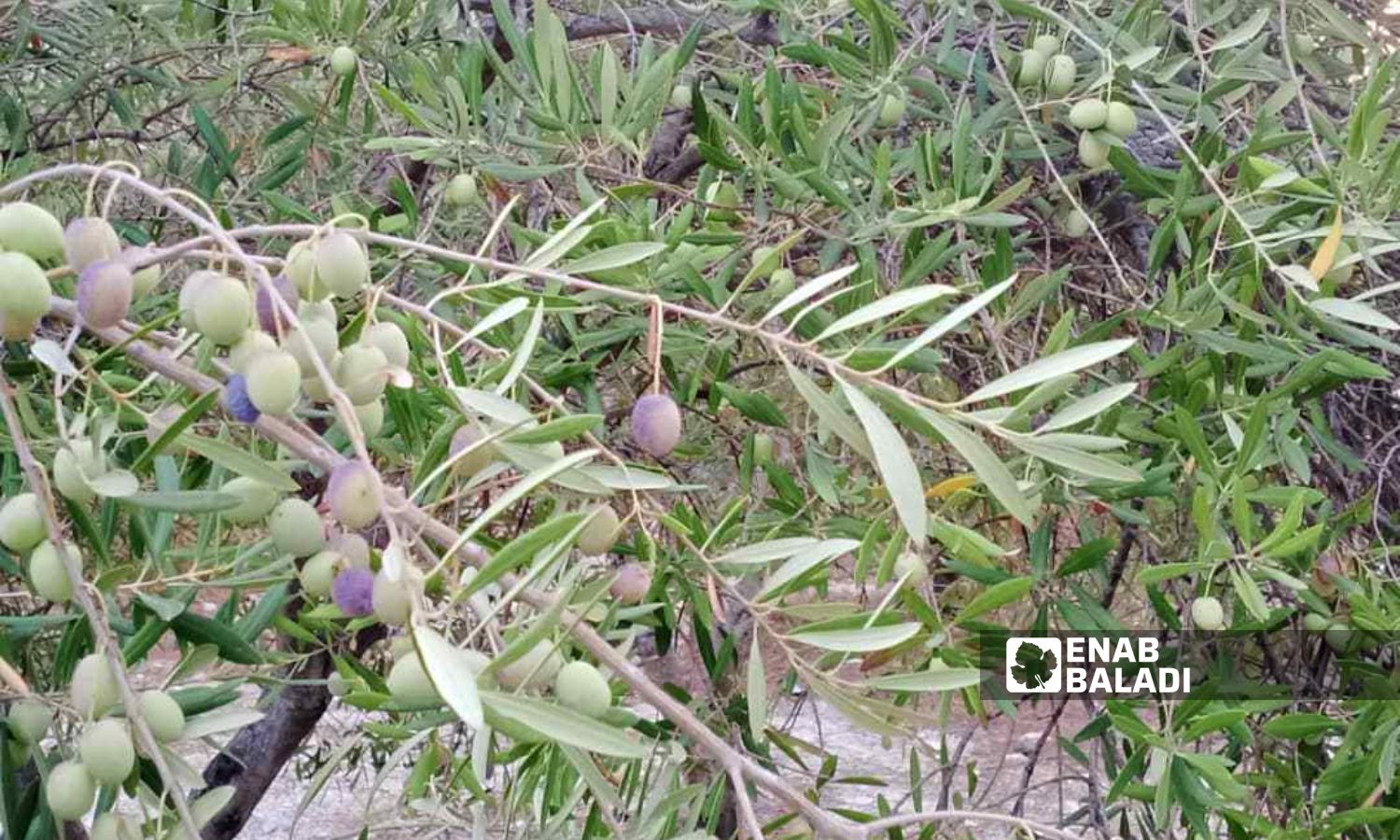



Latakia – Linda Ali
The 47-year-old Yasar does not hide his deep regret for selling eight tins of olive oil at a price not exceeding 250,000 Syrian pounds per tin. Today, he does not know where to get the money needed to buy supplies of oil during this season after the scarcity of production on his two-dunam land in the countryside of the coastal city of Latakia.
Yasar’s land produced about 24 cans of olive oil last year, but this year, it will not produce even two cans (each can is about 16 liters).
Yasar’s family needs about a whole can of olive oil per month, he said, pointing out that they “drink oil like water” in reference to its large consumption.
The olive harvest season began in Latakia on September 20, bringing with it losses for farmers and weak production that broke expectations, taking into account that the low production is because this year is an “alternate bearing” year.
Olive tree alternate bearing is the tendency of some trees to produce much greater than average crop in one year and much lower than average crop in the following year.
The area of land cultivated with olives in Latakia governorate is 41,389 hectares, and the number of families working in its cultivation is about 57,323 families.
Yasar said that the olive season is good one season and bad the next, and therefore, he expected production not to be large, but not to this extent. During previous seasons, the production of the “bad” season was at least half of the production of the good season.
He added that the price of the tin reached 1.2 million Syrian pounds, with unconfirmed talk that the price dropped to between 800,000 and one million Syrian pounds, and even if it was sold at this price, it is much higher than he could afford.
Yasar said that he was unable to care for his land properly as a result of the high price of fertilizer and that he was only able to plow it once this year, while it needed to be plowed twice, due to the high cost of plowing one dunam to 100,000 pounds for tractors, and 75,000 pounds for plowing in the old traditional method that relies on animals.
In his turn, Mohsen, 56, a farmer from the countryside of Jableh city, was unable to fertilize his land this year, as the cost of fertilizing one dunam amounted to about 700,000 SYP, and today he realizes that he is footing the bill, as a result of losing his season this year.
He told Enab Baladi that three dunams (about 2700 m2) of olive trees would not produce even three tins of oil, pointing out that he would even buy supplies of green olives after he had been distributing them to the neighbors.
Mohsen’s dreams collapsed. He had some hopes for a good season, saving part of it for the coming “dark” days and to help cover part of the household expenses and his children’s studies, according to what he said.
An agricultural engineer, who preferred to remain anonymous, said that the olive tree alternate bearing is not new on the Syrian coast, but this year, it is clearly very large, and this is due to two main reasons. The first is the abundance of production last year, and the second is the inability to care for olive trees due to the high costs.
The engineer confirmed that if the farmers had been able to fertilize the land and take care of their crops, production would have reached 75% compared to last year when production was abundant.
Caring for olive trees requires two basic conditions: the first is fertilizing the land, and the second is pruning the trees after the good season ends, according to the engineer, warning against pruning them during the “bad” season like the current year.
According to the agricultural engineer, each dunam of olive trees requires about 23 kilograms of urea fertilizer, in addition to 22 kilograms of phosphate and 20 kilograms of potash.
The price of a kilogram of urea fertilizer is about 13,000 pounds, meaning that a dunam needs about 300,000 pounds, while the price of the rest of the types combined reaches about 500,000 pounds, which means that each dunam of olive trees needs about 800,000 pounds for fertilizers, in addition to 200,000 pounds for plowing twice during the year.
The previous amounts are considered astronomical for the majority of farmers, especially those who were subjected to what they described as a “massive fraud” when they sold oil at the beginning of last season at a price not exceeding 250,000 pounds per can, while its price today has risen approximately five times.
Expectations indicate the production of 45,179 tons of olives, including 11,774 tons in Latakia, as the Director of Latakia Agriculture, Bassem Douba, told the local al-Watan newspaper that oil production will reach 10,000 tons this season.
The volume of production last year amounted to 210,000 tons, according to previous statements by the Director of Agriculture, reported by the al-Baath newspaper affiliated with the ruling party, meaning that production this year is less than a quarter.
During the year 2021, which was considered an “olive tree alternate bearing” year, the production volume reached about 88,000 tons, according to the head of the olive department in the Latakia Agriculture Directorate, Omran Ibrahim. That is, about twice more than the current season’s production expectations as well.
if you think the article contain wrong information or you have additional details Send Correction